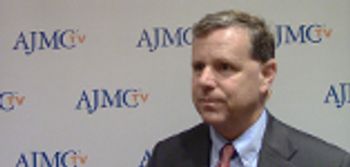
A new report from the Kaiser Family Foundation examines preliminary data on premium rates and plan offerings on the Affordable Care Act’s exchanges.

A new report from the Kaiser Family Foundation examines preliminary data on premium rates and plan offerings on the Affordable Care Act’s exchanges.




Every week, The American Journal of Managed Care® recaps the top managed care news of the week, and you can now listen to it on our podcast, Managed Care Cast.

This week, the top managed care stories included bipartisan proposals for fixing the Affordable Care Act (ACA); FDA approved a targeted therapy for patients with acute myeloid leukemia who have a rare genetic mutation; and a study found that more patients have gained access to clinical trials after the ACA was implemented.

Medical bankruptcy is indefensible and even if patients are willing to bankrupt themselves to purchase a cure, doesn't mean that is how pricing and reimbursement of treatments should be handled, said Darius Lakdawalla, PhD, Quintiles Chair in Pharmaceutical Development and Regulatory Innovation at the School of Pharmacy at the University of Southern California

After Senator John McCain (R-Arizona) returned to Congress last week after surgery and a brain tumor diagnosis, he called on his fellow senators to put aside partisan differences and work together on healthcare reform. In the House of Representatives, a bipartisan group is trying to do just that.

After the Affordable Care Act (ACA) required private insurers to pay the standard-of-care costs for patients participating in approved clinical trials, the rate of patients cleared by their insurer to take part in early-phase oncology trials has increased, a new study has found.



Every week, The American Journal of Managed Care® recaps the top managed care news of the week, and you can now listen to it on our podcast, Managed Care Cast.

With Senator John McCain of Arizona joining with Senators Lisa Murkowski of Alaska and Susan Collins of Maine, Republicans were unable to pass the skinny repeal option.

With Republicans unable to agree on legislation to repeal and replace the Affordable Care Act (ACA), the next step may be to work out some bipartisan fixes with Democrats. Here are 5 ideas that could appear in a bipartisan deal to fix the ACA.

When Donald Trump was elected president in November 2016, repealing the Affordable Care Act (ACA) suddenly became an attainable goal for Republicans in Congress. Here, we look back at the legislative twists and turns of ACA repeal efforts in 2017.

Every week, The American Journal of Managed Care® recaps the top managed care news of the week, and you can now listen to it on our podcast, Managed Care Cast.

The data confirm what Medicaid beneficiaries report and what a study by a Wharton School professor found: physicians' willingness to take on Medicaid patients is directly related to reimbursement rates.




The revised bill still converts Medicaid to a block grant program but gives states some flexibility, sets aside billions to combat the opioid crisis, and gives health savings accounts a bigger role.

Administration officials say fewer insurers filing an intent to offer coverage for 2018 shows the ACA is failing.

The Trump administration’s healthcare priorities have mainly focused on replacing the Affordable Care Act or reforming Medicaid, leading to concerns that value-based purchasing efforts will be left in the dust, said David M. Cutler, PhD, of Harvard University.

A House Subcommittee has passed an appropriations bill that would direct the Internal Revenue Service (IRS) to stop implementing the tax on Americans without health insurance known as the individual mandate.

Senate Majority Leader Mitch McConnell (R-Kentucky) faces the challenge of bridging the gap between conservatives who want a full Obamacare repeal and Republican members facing protests at home over losing Medicaid expansion.

259 Prospect Plains Rd, Bldg H
Cranbury, NJ 08512
© 2025 MJH Life Sciences®
All rights reserved.
